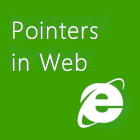W3C publishes Microsoft’s – how to support multiple pointer types in web sites! More standards leadership.
 Today the W3C has accepted and published Microsoft’s submission of a new way for Web sites and app developers to support multiple pointing devices, such as mouse, pen and multi-touch.
Today the W3C has accepted and published Microsoft’s submission of a new way for Web sites and app developers to support multiple pointing devices, such as mouse, pen and multi-touch.
Microsoft: Today, most web content is used with and/or designed for mouse input. Those that handle input in a custom manner typically code to DOM Level 3 Mouse Events. Newer computing devices today, however, incorporate other forms of input, like touchscreens or pen input. Event types have been proposed for handling each of these forms of input individually. However, that approach requires a step function in opportunity cost to authors when adding support for a new input type. This often creates a compatibility problem when content is written with only one device type in mind. Additionally, for compatibility with existing mouse-based content, most user agents fire Mouse Events for all input types. This makes it ambiguous whether a Mouse Event represents an actual mouse device or is being produced from another input type for compatibility, which makes it hard to code to both device types simultaneously.
W3C: The proposed event model described in this specification defines mechanisms for managing multiple concurrent pointer instances simultaneously from one or more input devices, for detecting which pointer event is the primary input, for identifying which device type produced each pointer, for allowing chorded button inputs to detect all of the buttons which are active during the dispatch of the event, and for allowing pointer events to be targeted at specific elements. This event model includes consideration for devices that do and do not allow for “hover” interaction, a major concern for accessibility.